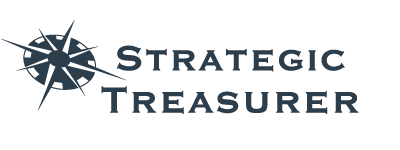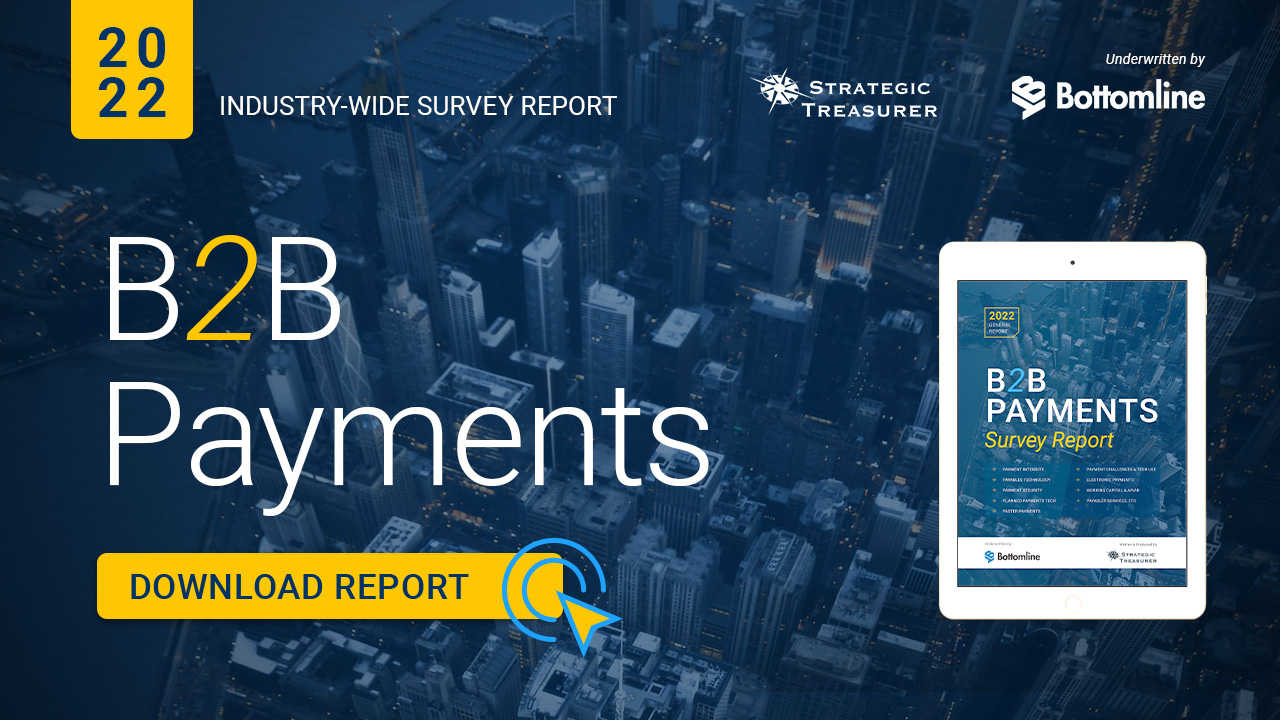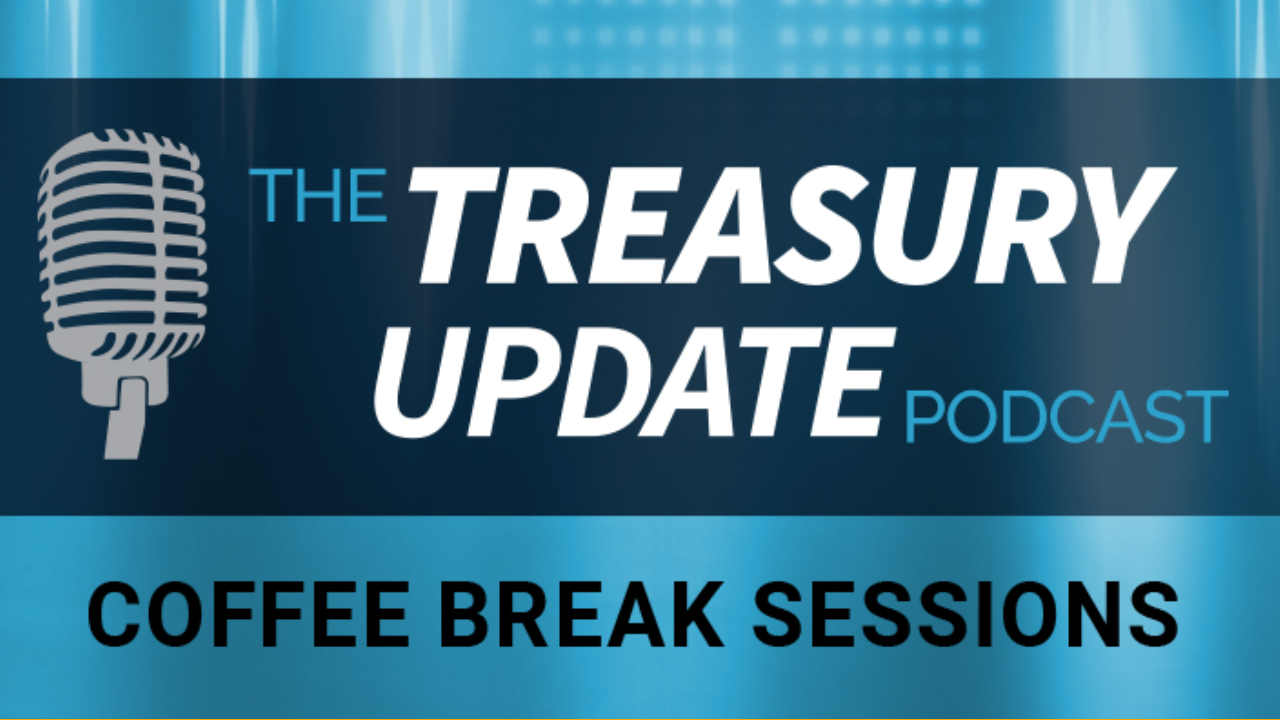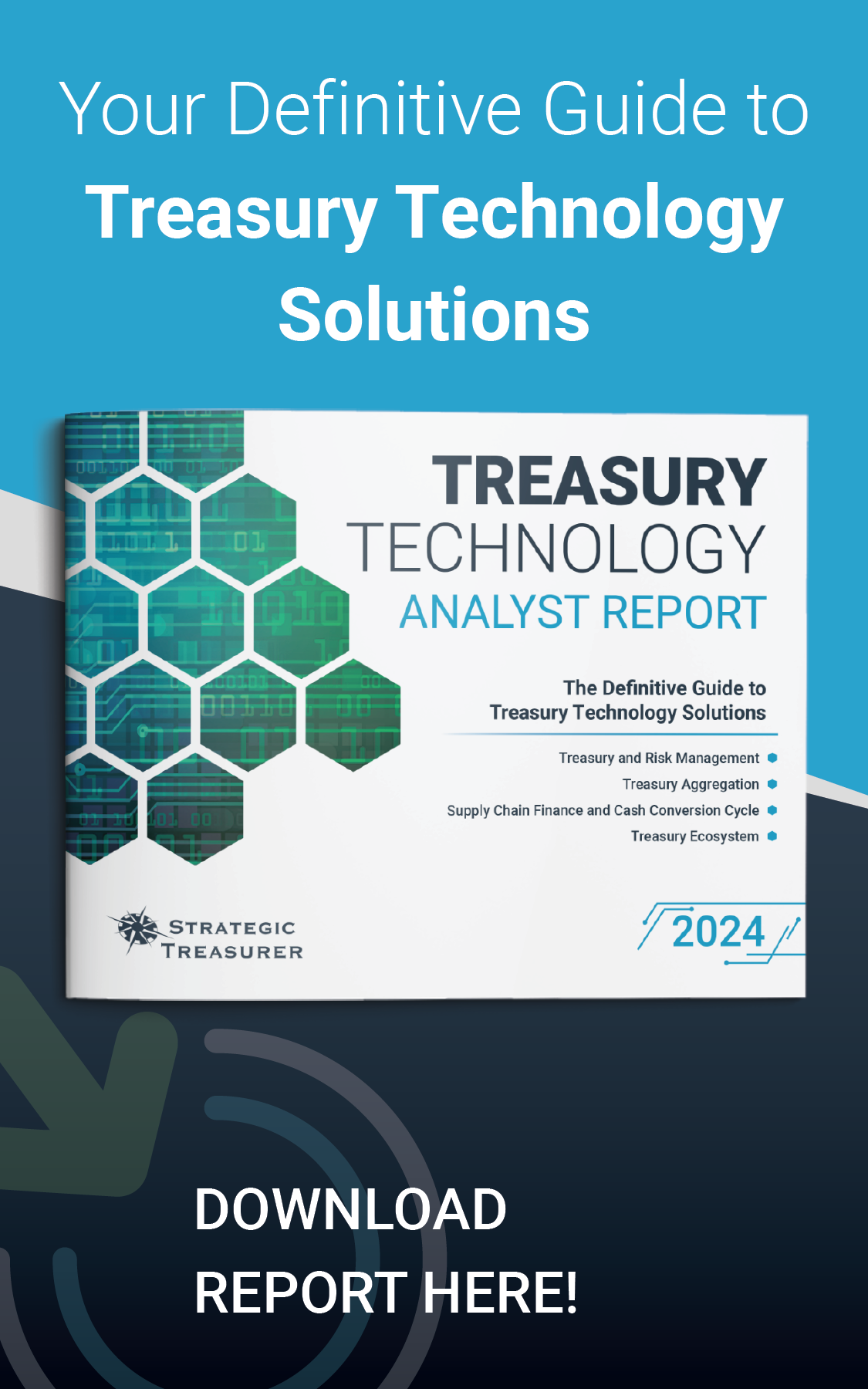
Session 81
Coffee Break Session:
What Is ACH?
What is ACH? Coffee Break Session Host Jason Campbell catches up with Strategic Treasurer’s Managing Partner, Craig Jeffery, to discuss the Automated Clearing House. They discuss what ACH is, its use, how it’s governed, and what to monitor. Listen in and hear more about ACH.
Host:
Jason Campbell, Strategic Treasurer


Speaker:
Craig Jeffery, Strategic Treasurer


Episode Transcription - (Coffee Break Session Series) - Episode 81 - What is ACH?
Jason Campbell 00:03
Welcome to the Treasury Update Podcast, Coffee Break Sessions presented by Strategic Treasurer covering foundational topics and core treasury issues in about the same amount of time it takes you to drink your cup of coffee. I’ll be your host Jason Campbell, business development leader at Strategic Treasurer. Welcome back for another great episode of the Coffee Break Session. You know, I’m looking forward to these next few episodes as we move the conversation to focus a little bit more on payments. So chatting with me today is Craig Jeffery, managing partner at Strategic Treasurer. Craig, glad to have you on today.
Craig Jeffery 00:35
It’s good to be here, Jason.
Jason Campbell 00:36
You know, it’s been a while since you’ve actually been on the Coffee Break Sessions, I know that you’ve been a busy guy. So we’re really looking forward to this episode. And actually next couple ones that we’re going to do along the way here. And as we get into spring, as we’re in this wonderful, the birds are chirping, the flowers are about to be blooming and the sun’s going to be shining. And I’m sure we’re all looking forward to getting out of winter and nothing better off to kick us off with some payment activity.
Craig Jeffery 01:01
Well, it’s been good to hear you and Paul talking about all manners of investments, finances, and economic things. That’s been good.
Jason Campbell 01:09
Yeah. And it’s, you know, we’ve had some great dialogue, great conversations and regards those topics. And as we kind of shift focus into a little bit, you know, as we talked about debt and capital Now, let’s talk about, let’s get some payment activity going here. So let’s kick off this session to talk a little bit about automated clearing house otherwise known as ACH. So let’s go right into it, Craig. So can you walk us through walk the audience about what exactly is ACH?
Craig Jeffery 01:35
Well, the automated clearing house and NACHA national automatic Clearing House Association or the name that they use to, or the abbreviation that they used to use for that is those two things are different, but they’re oftentimes used synonymously. So NACHA is the governing body of electronic payments, this was formed way back in 1974. So it’s created in 1974. So that’s, that’s the association or the governing body. NACHA is that network that moves electronic payments in the US and back in 2021 $73 trillion, with payments moved through the ACH network, which is about three times with a current GDP, so pretty big movement of funds through through the network.
Jason Campbell 02:21
So I know like from a standpoint of individually, like how ACH impacts me, but let’s talk about a little bit more on the commercial side of things. And what is ACH really used for?
Craig Jeffery 02:33
Well, across the board, it’s used for things like direct deposit payroll, that’d be the consumer side, it might be used for corporate payments, or concentration, moving funds between accounts, it can be used for for different types of debits, where you’re, you’re essentially pulling money. It’s used for electronic methods, as opposed to paper based transfers. You know, one of the things about the ACH network is, it’s historically been this batch forward system. So people submit large batches, let’s say, of payroll, or of corporate AP payments, there’s a huge batch that gets sent to the bank, the value date might be the next day or two days later. And so it gets processed and then settles on the day or the settlement date, which is usually the next day or the next the next business day, or next banking day, the next banking day after that.
Jason Campbell 03:22
So I know for like me, personally, I know that, you know, when there’s opportunities where I can pay for things, you know, from an ACH perspective, and like, hey, you know, automatic drafts, it’s an ACH, debit or things of that nature. I’m like, Yeah, game on, because it just eases the way that I do business in my day to day life. I don’t know like, is it? Is it similar to that like in a business mindset, like if I’m a business owner, and I or somebody that’s a business owner, but even from an AP perspective, or an AR, I guess from account receivable rights as as payments is like, is that kind of the similar sediment? Like is it an easy way of getting payments?
Craig Jeffery 03:57
Well, I think it depends on the mindset of the company or the person. But from an AR perspective, receiving your payments with an ACH is a pretty effective way of getting payments you. It’s very inexpensive, when the money comes in, you don’t have to worry about checks are expensive transactions, it’s low cost, very efficient. And oftentimes you’re getting notification a day or two earlier of your payments. So So you have good information about when your payments going to come in. That’s a pretty helpful feature for on the receipt side. On the payment side, the adoption is a little bit slower. And usually that stems from one of a couple things one, this you know, older notion of hey, I want to deal with the male float and so I want to mail checks and let them go through the Postal Service and eventually get there and deal with all the calls and think hey, this is great. I’m dealing with all this extra float. I have a financial benefit which is not necessarily great because you could still target your ACH payments. date on the date you want them to clear the idea of on the payment side it’s it’s less expensive to clear through the banking system electronic pay bid methods continue to decrease in cost. Whereas paper methods or some of the other methods tend to increase. And so I’m just comparing ACH to check. There’s obviously lots of other payment methods. I don’t know if that answers your question or not.
Jason Campbell 05:13
No, no, it does. Um, you know, I just think about from from an ease perspective, I think ACH is just one of those, you know, it’s a convenient option. I’m all about convenience. I love convenience. And I’m sure many people look at that as as a pure advantage when it comes to that. So I know that you were mentioning.
Craig Jeffery 05:28
Yeah, I mean, when a points like on the consumer side, like if you have like, let’s say, your water bill, some people are like, No, I want to write a check, or I want to initiate a payment through a portal. Even if it drafts my account, I want to control it. So usually, you can you have the ability through these portals, to control when the payments hit your account, the debits would pull the money out of your account, to pay your utility, or you can set it up. So it automatically comes out with a predetermined date, those tend to be quite a bit easier than perhaps some other methods. Sometimes, if you use a card and the card fraud, and they change the numbers or you make changes, they have to go back to the 10 vendors you’re paying with and make those changes. Now, some of the card companies have gotten much better about maintaining consistent payments, even with an old compromised credit card number to keep those going. But this is just a easy way to eliminate. Now I’ve got to go I have to do something to pay for my water or to pay for my electricity, it automatically occurs.
Jason Campbell 06:29
Right? So I know like earlier in the conversation, you were talking about NACHA. And you kind of go back to that for just a quick for a quick second there. kind of walk us through Are there any standards that regulate ACH domestically, or even globally?
Craig Jeffery 06:44
Yeah, certainly. So. So as far as a governing body, the notches, the association that helps set the rules and help guide those rules. There’s different regulations, like in the Uniform Commercial Code, there’s there’s regulations that guide that a lot of people think of, you know, rhaggy, and some of the other regulations that exist govern that, that’s probably more than we can cover in a coffee break session. But there are certainly a number of regulations that are more uniform, the Uniform Commercial Code covers, essentially most of the US, essentially all the US for requirements, if there’s fraud or the rules of signing up or, or breaking terms for, let’s say, an automatic payment that you have, let’s say for a gym membership. Right, you cancel that, but they keep debiting. You and how do you dispute that? There? So there’s rules that govern that both within the NACHA rulebook as well as within some of the regulations and the Uniform Commercial Code.
Jason Campbell 07:43
So how safe is ACH? Like I was saying, like we talked about, there’s a lot of convenience, there’s a lot of advantages to that, you know, obviously, it’s a regulated way to have payments occur. And, you know, not only just how safe is it, but is there anything in particular to watch out for?
Craig Jeffery 08:00
Well, ACH payments are still quite safe. There, they’ve definitely seen an uptick in the amount of fraud that’s occurred. And part of that is, everyone continues to put more and more defenses on their payment methods. So things like virtual cards have gotten used more heavily, very hard to break one time use cards. So where are the criminals going, they’re going where they can get money, where they can still find some way of penetrating a system or, or creating a way of exactly extracting funds out of a company. So they’re very safe for a consumer, I think they’re extremely safe, you have a long period of time to review and check over your statements. If there’s something fraudulent, you can back it out. On the corporate side, I think they’re they’re quite safe to if you’re initiating payments, and you have a regular process of reviewing, to make sure that you’re reviewing all of your accounts on a daily basis. You’re looking at the debits and credits that come out to make sure that all of those credits you sent out, they match up with the batches that your systems had generated. And any debits occur and come from a single account, or a designated account for debits where a third party would debit your account. That way any other type of debit that may hit would be quickly identified. In addition to that there’s a number of services security services that banks offer to limit and restrict ACH debits from hitting your account. So there’s debit filters, debit blocks, there’s depending on the system that the bank is using what’s sometimes referred to as electronic pre authorization where certain designations exist to allow someone to come in and debit the account, let’s say a taxing authority or your healthcare system so that they can still have their efficient way of debiting you and yet you’re blocking everything else but that but it’s not a there’s no problems with any payment system. There are some challenges there on the fraud side, but there’s their security services so you have to be mindful on the fraud side for everything, right?
Jason Campbell 10:02
Well, it’s like anything else, right? You gotta have a systematic approach to your checks and balances. You got to make sure that unit credits and debits everything in lines up right just to make sure that there’s nothing going on having safe secure protocols just like any other payment monitoring and payment security right, completely understand. Well, thank you, Craig, for joining me today really do appreciate it was great, you know, having a conversation and really talking with our listeners around, you know, ACH and giving us some insight behind that. And for our listeners, please be sure to tune in every first and third Thursday of the month for a new episode of the Coffee Break Session. As usual. If you have any questions, comments or feedback, send us a note at podcast@StrategicTreasurer.com. Until next time, take care.
Announcer 10:45
This podcast is provided for informational purposes only and statements made by Strategic Treasurer LLC on this podcast are not intended as legal, business, consulting, or tax advice. For more information, visit and bookmark StrategicTreasurer.com.
B2B Payments Report
This study provides valuable insights related to the overall payments complexity and challenges being experienced by practitioners within the treasury and finance environment, and also sheds light on the unique solutions and tactics employed by organizations to optimize payment processes and maximize efficiency.
Coffee Break Sessions – A Treasury Update Podcast Series
A part of the Treasury Update Podcast, Coffee Break Sessions are 6-12 minute bite-size episodes covering foundational topics and core treasury issues in about the same amount of time it takes you to drink your coffee. The show episodes are released every first and third Thursday of the month with Host Jason Campbell of Strategic Treasurer.




